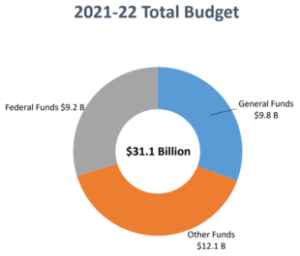Staff reports | South Carolina House members will consider something new this week in the state’s $10 billion budget — a single line item that sets aside $500 million to keep agencies from making midyear cuts that could be brought on by unexpected pandemic expenses.
“That is General Fund money (or money from state taxes) that was set aside as a first line of defense should revenues not continue to remain positive and stable,” said S.C. House Ways and Means Chairman Murrell Smith, R-Sumter.
The state currently has two reserve, or “rainy day,” funds. But rules on those funds restrict spending to balancing the state budget at the end of the fiscal year. In other words, if an agency had a shortfall during the year from something, like say a pandemic, then it would have to make program cuts, lay off workers — or both.
Last fall, Senate and House staffers started discussing ways to give agencies more flexibility in case revenue streams are hit after July 2021 because of economic reactions to the pandemic. They came up with the notion of setting aside $500 million in surplus dollars if things go awry. But if nothing is spent by June 30, 2022, lawmakers can use the money for something else — or keep the reserve intact for other midyear rainy day needs as might come with a hurricane or flood.
Observers say this is smart budgeting because it anticipates challenges with a solution that will improve the stability of the budget so state agencies don’t have ups and downs with staffing and programs. Read the full story at our sister publication, Statehouse Report.
Also in recent news:
![]() Students to have in-person high school graduations. The Charleston County School District has announced that local high schools will hold outdoor in-person ceremonies using COVID-19 protocols in mid-June. More information will be available from individual schools, according to a press release. See the schedule.
Students to have in-person high school graduations. The Charleston County School District has announced that local high schools will hold outdoor in-person ceremonies using COVID-19 protocols in mid-June. More information will be available from individual schools, according to a press release. See the schedule.
Epidemiologists worry about another state virus surge. With more than 50 percent of South Carolinians now eligible to receive a COVID vaccination under phase 1B of the state’s rollout plan, demand is high but supply remains low. According to the S.C. Department of Health and Environmental Control (DHEC) vaccine allocation dashboard, 95 percent of Pfizer-BioNTech vaccines and 60 percent of Moderna doses have been administered. Based on data from the dashboard, there are currently 653,944 Pfizer and Moderna appointments scheduled though roughly 450,000 doses of the two vaccines remain as of this morning. The state received 61,100 doses of the one-shot Johnson & Johnson Janssen vaccine, but with 52 percent of that vaccine already being utilized, the state needs to receive more shipments soon to keep up with demand.
S.C. House gives green light to open carry of handguns. House members voted 82-33 in favor of the open carry with training bill after hours of debate. Some Democrats joined Republicans in the vote. The bill would allow persons with concealed weapons permits to keep those guns visible in public. Hopkins Democratic Rep. Jermaine Johnson called the bill “no more than legalized hunting for Black people.” The bill now heads to the Senate. More: AP News.
S.C. has one of worst wage gaps in nation, study says. South Carolina has among the most severe gender pay gaps in America, ranking 40th among the 50 states in a new study. According to data from the Business.org study, the average annual salary in S.C. for women is $37,584 while men average $48,541 — a nearly $11,000 difference resulting in a pay gap of 23 percent. S.C. sits on the list between Montana and Mississippi, but our northern neighbor North Carolina ranked 7th in the nation with a gap of 14 percent. More: Charleston City Paper.
S.C. legislators add sexual orientation back to hate crime bill. A group of South Carolina lawmakers have added back protections for gay or transgender people to a hate crime bill, five days after removing them. More: AP News.
Hate crime bill urged by Emanuel AME Church pastor. The Clementa Pinckney Act, House Bill 3620, has passed the House’s Judiciary Committee and is on its way to debate on the House floor. The bill’s name honors one of the victims of the 2015 white supremacist rampage that killed nine people at a Charleston church. Pinckney was also a state senator. The bill seeks to add racial and other bias motivations for crimes to offenses. The state currently does not have any hate crime legislation, making it one of four in the nation. More: WCBD.
State flag design continues to spark debate. South Carolina senators may soon take up one of the most divisive issues to hit the state in years: standardizing the state flag’s iconic design. More: AP News.
- Have a comment? Send to: editor@charlestoncurrents.com




 We Can Do Better, South Carolina!
We Can Do Better, South Carolina!
























